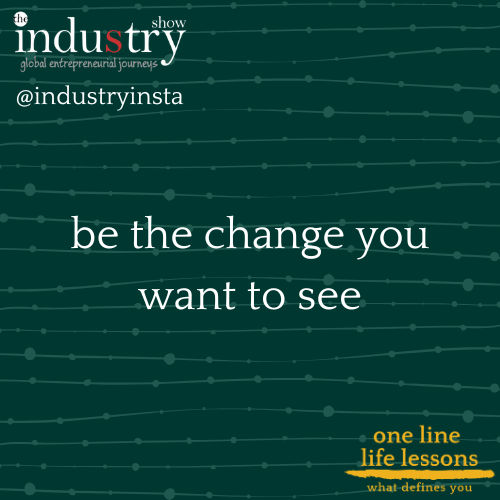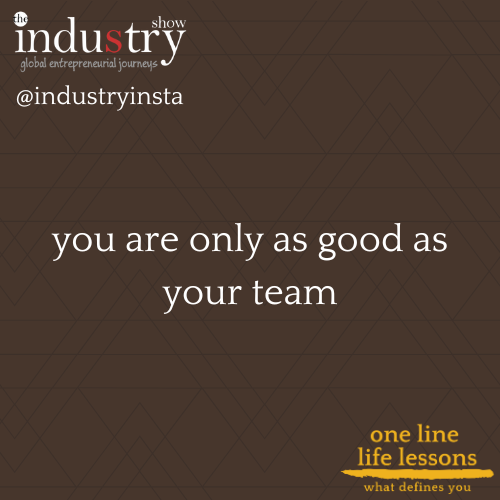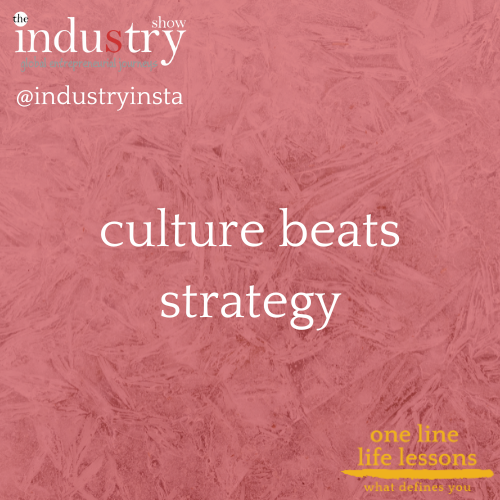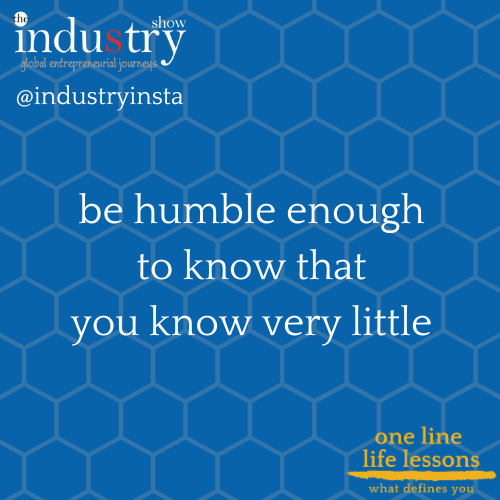Nov 9, 2024
Sridhar
Sundaram
Sridhar Sundaram is the Dean of California State University, Fullerton’s College of Business and Economics – one of California’s premier business schools known for its diverse student body and emphasis on hands-on learning. Previously, he was the Dean of the Kate Tiedemann School of Business and Finance at USF St. Petersburg and Associate Dean at Grand Valley State University.
One Line Life Lessons from Sridhar





Episode Highlights
- 0:00 – Introduction to Sridhar Sundaram
Sridhar Sundaram shares insights from his upbringing, emphasizing the influence of his father’s curiosity and his mother’s leadership skills. - 1:15 – Role at Cal State Fullerton
Discusses his significant role at Cal State Fullerton’s College of Business, serving over 10,000 students, many of whom are first-generation college attendees. He highlights the potential to impact both students and their families. - 2:30 – Student-Centered Education
The college’s commitment to a student-centered education is highlighted, focusing on a modern curriculum that integrates theory with practice, alongside opportunities for personal and professional growth through alumni engagement. - 3:45 – Community Impact Initiatives
Emphasizes the college’s positive societal impacts, particularly its engagement with the Little Saigon community, showcasing its commitment to local partnerships. - 5:00 – Benchmark Study and International Engagement
Introduces a benchmark study aimed at providing data for cities seeking grants, as well as plans for a trade mission to Vietnam to foster local business partnerships. - 6:30 – Importance of International Students
Highlights the contributions of international students to local communities and the institution’s global influence, underlining their role in the educational ecosystem. - 8:00 – Challenges in Higher Education
Discusses key challenges, including demographic changes in the K-12 population and internal bureaucratic constraints that complicate operations at Cal State Fullerton. - 9:15 – Need for Team Morale and Internal Improvements
The necessity for maintaining team morale and streamlining internal processes is underscored as a solution to current challenges. - 10:30 – Emphasis on Adaptability and Communication
Expresses the importance of adaptability and open communication regarding bureaucratic hurdles as indicators of strong leadership. - 12:00 – Innovating the MBA Program
Shares enthusiasm for innovating the MBA program, focusing on co-curricular activities and strategic partnerships in data and technology to enhance the curriculum. - 13:30 – Community Engagement
Stresses the significance of community engagement and collaboration with local organizations to improve educational outcomes. - 15:00 – Lessons from Leadership Experiences
Reflects on lessons learned from leading innovative initiatives, particularly the importance of knowing when to discontinue unscalable projects. - 16:30 – Building a Community Temple
Discusses the success of building a community temple in Michigan, which serves as a vital gathering place for the local Hindu community. - 17:45 – Personal Interests
Shares personal interests in tennis as a way to unwind and socialize, along with a passion for leadership literature and technology, especially AI, to enhance leadership effectiveness. - 19:00 – Advocacy for Authentic Leadership
Advocates for authenticity, accountability, and personal responsibility in driving change, emphasizing teamwork, humility, and a supportive organizational culture as keys to success. -
Show Transcript
Transcript - Full Episode
[00:00:00 – 00:00:08] Nitin Bajaj
Everyone. Welcome to the industry show. I’m your host, Nitin Bajaj. And joining me today is Dean Sridhar Sundaram. Dean, welcome on the show.
[00:00:09 – 00:00:10] Sridhar Sundaram
Thank you very much, Nitin.
[00:00:11 – 00:00:16] Nitin Bajaj
Great to have you here. Let’s start with the existential question. Who is Sridhar?
[00:00:16 – 00:00:47] Sridhar Sundaram
Great question. I’m a product of my parents and 2 very different people. A father who is inclusive in his insatiable desire for knowledge, can read anything, anywhere, and finds new information, and a mother who’s a natural born leader. So on a personal front, I’m a good combination of both and a pragmatist. So that tries to live, and I feel like it’s important for me. Those are key elements of who I am.
[00:00:48 – 00:01:20] Nitin Bajaj
Amazing. And I can’t think of anybody better than you to do what you do and to lead an entire generation, multiple generations, in fact, of students and young minds that need that kind of mentoring and guidance. So give us a sense for what the College of Business is and also within the context of Cal State Fullerton. And what I love to learn about is the impact that your and your team’s work has been able to create.
[00:01:21 – 00:04:09] Sridhar Sundaram
Thank you. One of the things that are attracting me to Cal State Fullerton and the College of Business Economics is the fact that we are actually touching a large number of students. The college officially has over 10,000 students in fall of 2024. The university is at 43,000. So we are about a 5th you know, 22% of the university at this point in time. But what’s interesting is that just not the numbers. Right? Half of our students are first generation. And so the ability to impact them, I feel it has a huge influence, not just in their lives, but as lives of their families for many years to come. So that opportunity and the responsibility is what keeps me going. Any bad day, all I have to do is to walk over to a student and go talk to him or her, and then you bring it back to saying, this is why I chose to do what I’m doing here. And you asked me about the college itself. And what is unique about our college is that it’s not only the talent that we’re developing here, but we also have 14 centers and 5 different programs that have huge connections within the community. So we have actually adopted a dual mission. Our primary mission is very much to look at a student centered education that revolves around our philosophy of giving them an updated curriculum that gives them the technical knowledge that they need. But I strongly believe that they need to have the ability to apply the knowledge in a practical setting. So they have the confidence to build the gap between theory and practice. But most importantly the third thing that is close to my heart is helping them with personal professional development. So why don’t we talk about meeting the executive, setting up opportunities for them to hear from our alumni? These are all opportunities. I feel strongly that it is important for us to create their flow. And the second part of it is really the, our community mission is to create positive societal impact. Whether it’s social or economic impact, we drive at both of them. And we work extremely closely with our centers to do that. And I’ll give you a simple example. Last Friday, our Center For Economic Analysis did, demographic and economic profile of the little Saigon community. And that’s one of the first kinds of studies we have done on a community like that. And it’s going to serve as a benchmark study as you’ll look at the future and also provide data for cities and others that are looking to apply for grants. That’s the kind of impact we, you know, really plan to have. And truly, when we look at the economic impact, we are actually doing a trade mission to Vietnam next year. That just to follow-up on the example is to build the partnership with businesses locally and the opportunity for them in a growing country like Vietnam. So that’s just one example of what we do. And then that’s what excites me about this job and the position and why I came here.
[00:04:10 – 00:04:26] Nitin Bajaj
And I think one thing we have talked about when you talk about the communal and the societal impact, you mentioned Vietnam and you’re taking students, you’re taking your team there, but also you have a lot of pretty big international student contingent.
[00:04:27 – 00:04:27] Sridhar Sundaram
Right.
[00:04:27 – 00:04:47] Nitin Bajaj
And the impact they have coming to this school and learning. And, of course, a lot of them want to stay back and create an impact for local communities, but many of them end up going back to their home countries. And that footprint and that impact spreads from just outside of Fullerton, outside of Orange County to many countries abroad.
[00:04:48 – 00:05:30] Sridhar Sundaram
Absolutely. And I think this is where we’re taking the approach of building strategic partnerships with the universities and others in different countries and the ability for not only to work with them to bring students here, but also to make sure that when the students come here, especially our international students, the ability to cater to their needs and be able to support them. Being an international student myself, I understand, and you understand. Right? These are at the formative stages, getting the right help makes all the difference. So we strongly believe we have to do that, either to provide the opportunity here or for them to have a good career back in their home country. So those are some of the things we’re working together with our strategic partners.
[00:05:32 – 00:05:56] Nitin Bajaj
I’m curious to hear with such a big footprint and so many different lives, many of them, as you said, are 1st generation coming to school. I would imagine there’s a number of challenges you and the team have to face. And if I were to ask you to name the biggest or the one that keeps you up at night, what would that be?
[00:05:57 – 00:07:18] Sridhar Sundaram
The two things for us are the demographics. If you look at what we know in all of the United States, the K through 12 population is not increasing. It’s in a steady state or declining in most of the states. And so understanding that demographic shift that’s coming and ready to be able to adapt to that is the existential threat for all of us looking at from a higher education perspective. The internal aspect is really that we are such a constraint system at Cal State Fullerton. Every day, dealing with the bureaucracy to the right thing. And so keeping the morale of my team up to say, let’s figure it out. Yes. It’s one more obstacle, but we can still do this. So I think that’s the challenge on a day to day basis that we’re trying to make our life a little bit better by working with teams to improve processes, both internally and within the university. But I think that’s the sometimes you really you’re only looking at it saying, why am I doing this if this is so hard? And it doesn’t have to be. And I think that’s the part. So we’re really looking at externally understanding how we will adapt to the demographic shifts and internally really challenging ourselves to say, how do we improve so that we, you know, we can be much more efficient and impactful in the way we do things.
[00:07:19 – 00:07:47] Nitin Bajaj
Susan, I really appreciate you being candid and transparent about the bureaucratic challenges. It’s not easy to call them out, but that’s a great sign of a leader who truly believes in and is on the side of his or her team. So I love that. Now on the flip side of challenges come opportunities. And if you were to call the one that most excites you, what would that be?
[00:07:47 – 00:10:46] Sridhar Sundaram
Yeah. So given our dual mission, I’m looking at the opportunities on the student side. Let me talk about first, I’m a risk taker. I’m a finance guy. I take calculated risks, and we make investments. And I look at treating our colleges like any other business. I need to make investments that make sense. Sometimes it will, you know, be very successful. Sometimes it may be a failure. It’s okay. And I’m really building the culture within the team to say, we have to continue to innovate. We cannot be stagnant. We need to be able to do that. And the opportunity as you ask us the ability to innovate, and that inspires our team.
So we are actually reformulating our MBA program. And we have a task force of faculty that are excited about it. They’re looking at it and saying, what can I do? Luckily, I’ve had experience of putting together 3 different MBA programs from my previous institution that I’m able to bring the knowledge to. But we also did research. We had a consulting firm that we hired to do the research on, given the data to them, but we were benchmarking the best practices, But saying, let’s build some innovations. And here’s how we are building innovations, is that as much as what we do in the classroom, I’m a strong believer the co curricular is equally important. So whether we have a 5 to 7 year old somebody with 5 to 7 years of work experience, what are the things we can do for them that can be innovative? So we really are working on understanding ourselves as a personality and strength finder, building some of these around the leading teams and throwing in an international trip. What is amazing is that even those with significant experience, when you go as a cohort, the learning experience is very different, and you become very close friends over a short period of time. And so we’re building those unique experiences and the ability to innovate. On the undergraduate side, we’re building a strategic partnership with a firm like Alteryx. We know data and technology is gonna dominate. So I’m preparing our team to think about how we move forward with building and embedding data and technology into our curriculum. But we cannot do this alone. Let’s find strategic partners. And we have had great partners who come to support us. And on the community side, the opportunities are to really look at and say, I was very fortunate in Michigan or in Florida. We were able to work extremely close to the community. So we have the opportunity to look at and say, what does this community need? And can we innovate by bringing in maybe Bajaj related accelerated programs working with a city or a partner like we have our Orange County Business Council or looking at our pro partners in Irvine that we can work with. Those are the abilities that I think excites me every day. What can we build that makes sense for the community and supports the community’s economic development so that we make it a slightly better place. And the same thing, the way we’re accomplishing for our students with these innovations, where the idea is to make sure that they are best prepared, when they leave the college and be ready to contribute to the organizations, from day 1.
[00:10:48 – 00:11:14] Nitin Bajaj
I love that academia and industry are really being brought together because I think in my own experience having gone to school, it’s disjointed and it’s not necessarily helpful especially when it comes to business or MBA programs. There has to be more you’re intertwined with the industry. It gives you more real experience that you can hit the ground running.
[00:11:15 – 00:11:45] Sridhar Sundaram
I agree. And I think that’s the part that comes from a family business background, and I’ve always felt extremely comfortable having one foot in academia and one foot in the industry. And also with a finance background, we’ve always worked with the industry. And I think that is also a great way for me to keep updated about What’s needed for our students? Right? I think that’s important that as a leader that I keep myself informed so that my leadership team understands and and so we’re able to bring in the the needed skill set for our students
[00:11:47 – 00:12:10] Nitin Bajaj
Now as we look forward, I wanna pause and reflect and ask you to share 2 moments from either your personal or professional life. 1 where things didn’t work out as you had expected, and he used the word, so I’ll use it. There was failure. There were lessons. And then another instance where things exceeded your expectation and became a success beyond your imagination.
[00:12:11 – 00:14:46] Sridhar Sundaram
I’ll tell you, the failure. Let’s talk about that. Right? I think so. When I was in Michigan, my dean had asked for we’re in the backyard of Michigan and Michigan State, so we were creating a new MBA program. And he said, hey. I want to create an innovative program, but it cannot be the traditional one. And I put my hand up and I said, happy to leave the task force. Let it. We had a fantastic, very innovative 14 month program that, you know, had an internship built into it. But in 5 years, we had a sunset, the program. There are some great lessons I learned. One is you can have an innovative product, but I need to understand the business model. The cost that I am, you know, built in with the uniqueness of this was very very made the program quite expensive from a cost perspective. 2, I’m a finance guy. I knew how to build everything, but I forgot to market the program. Very important lesson. Now I’ll never forget about that. And I learned so many lessons. We built the executive MBA program right after that, which is still thriving, which is very successful. So that was probably one of the professionally, one of the best experiences of putting together a program. I learned a ton from bringing people together around innovative ideas and putting a good program together, but also having the understanding as a leader. If you can’t scale the program, we will have to sunset at some point in time. And it’s okay. There’s nothing wrong with that. In academia, we love to start, but we never love to sunset anything. So that probably was a key moment in my professional life that I learned a lot from that experience, that even today, I’m implementing that. On a personal side, I would say the success was that I’m not an overly religious person, but I’m a Hindu. But we had 2 young kids when we were in Michigan, and we wanted to give them an identity. So there was a group of people or older people that had the financial resources, and there was a group of young people with young families. And we said, we need to build a temple. And, actually, it took us 10 years, but we did it. And that temple serves the entire community. It’s probably one of the most rewarding experiences for me from a personal and a community perspective that we could be part of that. And I’ve served the board for many years as a treasurer, as a president, and a board chair. But more importantly, as one of the people that was really instrumental in helping build this that serves so many people within that community there. On the success side, I would say that probably was the most rewarding and satisfying experience for me.
[00:14:46 – 00:14:59] Nitin Bajaj
And I can resonate with that. It’s a communal space. It brings a lot of people that have faith together. And the impact of that is going to stay here for many years, maybe generations to come.
[00:15:00 – 00:15:12] Sridhar Sundaram
So you’re absolutely right. And that’s why we go back and we see that. I mean, like, you know, now it’s the next group of leaders who have taken over and and and continue to build upon it. And the most satisfying thing for you is, you know what? We were part of this.
[00:15:12 – 00:15:16] Nitin Bajaj
Yes. Congratulations and kudos on that.
[00:15:16 – 00:15:16] Sridhar Sundaram
Oh, thank you.
[00:15:16 – 00:15:41] Nitin Bajaj
And also on, again, being very open, vulnerable, and transparent about your lessons and how I think a lot of people hesitate to use the word failure. Yeah. I come from the belief that failure is just part of the journey. And if we don’t fail, we don’t learn, we don’t improve, we don’t get better. So I love how you kinda just take it in stride and just keep going.
[00:15:41 – 00:15:53] Sridhar Sundaram
It’s two sides of the coin. 1 is success, 1 is failure, and it’s okay. It’s you know, we did our best Sundaram sometimes, you know, there are things that come together and there are sometimes things that don’t come together, and it’s okay. We’ll still learn a lot from
[00:15:54 – 00:16:08] Nitin Bajaj
- True. Now a little lighthearted moment. Yeah. I wanna know just knowing a little bit of your schedule, this may at best be a joke. What do you do to relax, have fun, kick back?
[00:16:09 – 00:17:02] Sridhar Sundaram
No. This is you’re gonna appreciate it, Nitin. One of the things I learned is that there are certain things I don’t compromise on. Tennis is my game, and that has served me well to relieve me from the stress. But also take me to a place with a group of people that you’re just Sri. You’re one of the guys that is on the tennis court playing. You’re having a good time, and it removes me completely from this thing. And then you get your frustrations out, and you just it is a great way to completely refresh yourself, both physically and mentally. And to a point where if I’m not in a great mood, my wife says, please get out and go play some tennis. I mean, I had to come back in a better mood. So I think that has become, you know, my great savior has been tennis. And now I’m picking up some golf, but trust me, sometimes it’s more frustrating to finish your order golf, come back.
[00:17:03 – 00:17:05] Nitin Bajaj
I completely relate to that.
[00:17:05 – 00:17:28] Sridhar Sundaram
Yeah. As a learner, but that has been for me and then social time with friends. I really make sure that there is a Friday evening or a Saturday that we are out with some friends and or maybe just my wife and I myself that that we do have our time that’s away from everything so that we do have an opportunity to rejuvenate even if you’re just sitting on the couch and watching a movie. So
[00:17:29 – 00:17:32] Nitin Bajaj
That’s amazing. I’m glad to hear that, and I’m looking forward to a game of tennis.
[00:17:32 – 00:17:33] Sridhar Sundaram
Absolutely.
[00:17:34 – 00:17:38] Nitin Bajaj
Yeah. Mix and mingle and talk about a lot of things that did not work.
[00:17:38 – 00:17:42] Sridhar Sundaram
It was a great time. It’s a fun way to meet people and from all walks of life. So
[00:17:43 – 00:17:50] Nitin Bajaj
So true. Now a favorite book or a podcast or a book can also be an audiobook.
[00:17:52 – 00:19:24] Sridhar Sundaram
It’s interesting. So my dad loved JFK. He would read every book on JFK. And for me, there are 2, you know, leaders that influenced me heavily. And on the West Side, it is Lincoln, one of my favorite people. And so anytime I get a chance to read a book on him, I try to do that. But more and more these days, it’s about leadership. The most recent one I’m reading actually is from this former president of UNLV, and he was at Arizona before that. It’s about leadership. I think you’re just curious to hear and see how the individuals approach that. And I’m a big fan of HBR. So Harvard Business Review, I’ll read Harvard Business. I’ll listen to the podcast there. And Simon Sinek is another and people like him. I enjoy that because they force you to think. And really there are some fundamental things asking the question of why and it’s a very fundamental thing, but I think it’s great. There’s not one particular thing now I’m gravitating more and more towards leadership strategy. Those are things that help me. And now I’m very focused on learning more about understanding technology, especially this world of AI, where, you know, when you talk to a lot of people, they talk about AI, but I’m not sure they have a complete comprehend understanding of it. Just like me, very little understanding. So I’m trying to really say, okay, how do I get a better understanding? And every time I meet someone, I’ll learn a little bit more and continue to read more articles on that space to educate myself so I can lead the organization better.
[00:19:24 – 00:19:32] Nitin Bajaj
All great choices. Thank you for sharing. Now onto my favorite part of the show. Yeah. We call this the one line life lessons. All yours.
[00:19:33 – 00:22:03] Sridhar Sundaram
Thank you. I’m gonna give you a few. One of the first things I had to learn as a leader was that you have to be comfortable in your own skin. And so that meant for me that, yes, you can be nice. You can be but you don’t have to compromise on professionalism. I give respect, and I take respect. But I’m gonna be nice. And as I said, why do I have to be an asshole before you respect me? So I but I learned is that, no. I don’t have to be that person. I can be who I am, but I can still people hold accountable. Number 1, be comfortable in your own spin. Number 2 for me is really, I, you know, really believe in, be the change agent you want to see. The change you want to see. And I believe that very much in this this saying this attributed to Gandhi in the sense that I can ask people to lead, people to change, you know, what I need to see. But at the end of the day, said, if I don’t take a step foot and take the responsibility, why should I somebody else do that? I think so for me, that’s something that I feel very strongly about. The third one I’m very much is who I am. Very strong believer in that I’m only as good as my team. So my team is really important. We hiring, having a good people, getting go good culture that could trust you, that you can trust them? That’s key. We have fun, but we can also have debates, arguments. But at the end of the day, we’re strong because we complement each other, not because we’re the same. And so understanding that you’re only as good as your team, I think is really important. And I completely agree culture beats strategy, always eat strategy, no question about it. So I really, really focus on building a strong culture in the organization. And this is where many people have helped me a lot and in helping me understand what, you know, what that means and how we, you know, continue to build upon it. But I really am focusing and spending more time in making sure we take care of the people here. You know, before we do anything else is that’s, you know, priority for us. But that’s part of the culture, you know, we really are building. And the last one I you know, again, this is who I am is that I’m humble enough to learn that I know very little, and I need to be able to learn from anyone and everyone. Everyone has something that I can learn from, and I strongly believe in that. And I and it is it just something that I’ve seen over a period of time that everybody has something that I can learn from. And I I would highly recommend that to people. So those are my 5 things.
[00:22:04 – 00:22:40] Nitin Bajaj
Thank you so much for sharing those, and I relate with every one of them, especially the last one. Yeah. Yeah. There’s a 5 year old can teach us so many things that either we’ve forgotten or we never knew and didn’t have that perspective. So it’s not about age. It’s about just having that respect for the other person, and, you can get so much more. Dean Sundaram, such a pleasure to have you and, talk about your journey and story. Congratulations on all the successes, but thank you for being you and helping the community become a much better place. We really appreciate it.
[00:22:40 – 00:22:50] Sridhar Sundaram
Thank you, Nitin. Thank you for this engaging conversation and also for all that you do. And I really appreciate it and look forward to a lot more collaborations and and working together with you.



